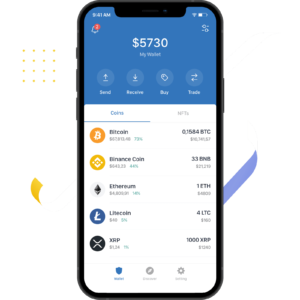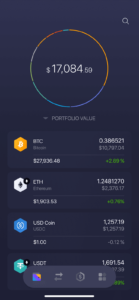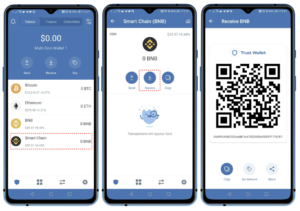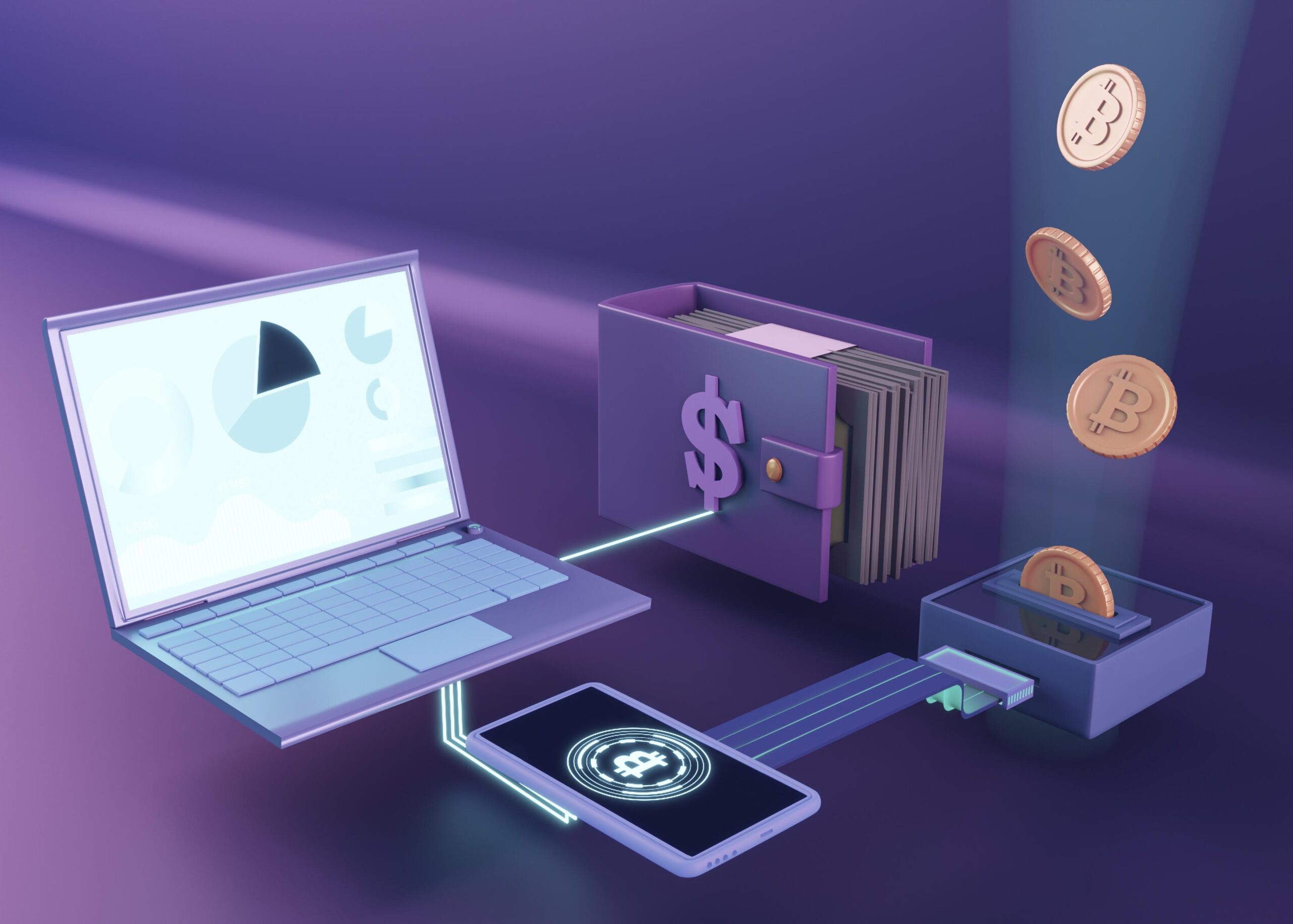Crypto Wallets are an essential tool for buying, trading and selling cryptocurrencies. Traders need them to store crypto securely, as well as to protect and validate transaction information. Here are some best crypto wallets.
- MetaMask

MetaMask is a digital wallet that allows users to manage, send and receive Ethereum and ERC-20 tokens. Users can also add the Binance Smart Chain network manually on Metamask to store and exchange BEP-20 tokens. MetaMask allows users to fully engage with Ethereum without having to download the complete blockchain. Users can operate an Ethereum Dapp without having to host a complete Ethereum node.MetaMask is the leading self-custodial wallet. The safe and simple way to access blockchain applications and Web3.
- Coinbase Wallet

Coinbase Wallet store and manage all of your crypto, NFTs and multiple wallets in one place. It is regarded as one of the most secure mobile wallets available. Coinbase wallet is a Bitcoin wallet that is under the user’s control. It serves as an independent entity and doesn’t require signing up for an account on the Coinbase crypto exchange. With the help of Coinbase wallet, you can safely store and easily view all your Ethereum and Polygon NFTs in your wallet.
- Edge Wallet

Edge is a smartphone wallet that makes it easier to store and trade cryptocurrencies. The wallet encrypts all of the user’s private data on their smartphone using client-side encryption, ensuring that only the user has access to their digital assets. Client-side encryption means all of your data is encrypted on your device. Only you have access to control your cryptocurrency asset. It supports multiple assets like Bitcoin, Ethereum, XRP, Dogecoin and more. Edge is a user-friendly platform for beginners.
- Trust Wallet

Trust Wallet is a decentralized open-source mobile crypto wallet that offers over 160,000 assets and blockchains and enables traders to accrue interest by staking their coins. Trust wallet supports major cryptocurrencies such as Bitcoin, Ethereum, and more. Initially, it was designed to support ERC20 and ERC223 tokens. The trust wallet comes with a Web3 browser that allows users to buy cryptocurrencies directly via the Kyber Network’s native DEX. It also allows users to use the Trust Wallet app to connect to other Ethereum-based Dapps.
- Exodus

Exodus is a multi-cryptocurrency wallet with a user-friendly interface. It may be used to hold a variety of crypto assets as well as any presently unsupported and custom ERC20 tokens. Exodus is a free mobile and desktop wallet. It supports a variety of altcoins, as well as Bitcoin. You may also use the wallet to swap tokens without having to register. Exodus is a fantastic choice for people who are new to cryptocurrencies. The wallet is an excellent choice for managing and trading the modest qualities of cryptocurrencies.
- Robinhood

The Robinhood Wallet app is a self-custody wallet that’s your portal to web3 where you can store and manage your crypto on the Ethereum, Bitcoin, Dogecoin, Polygon, Arbitrum, and Optimism networks. Robinhood Wallet gives you full control over your crypto, which means you hold the private keys to your assets. If you utilize the app version of the platform, you will be able to enable two-factor authentication and add unique PIN numbers to ensure even higher levels of security.
- Mycelium

Mycelium wallet is one of the most well-known Bitcoin wallets. This is a mobile wallet that is supported by both iOS and Android. It only accepts a few types of cryptocurrency compared to others. You may send and receive Bitcoin, Ethereum and ERC-20 tokens like Tether USD, USD Coin and Binance USD. Mycelium allows you to purchase and sell crypto directly from the app, and you may buy it with ordinary fiat cash. The Mycelium wallet provides quick connection and the ability to connect with popular hardware wallets such as Ledger and Trezor. Its simple interface allows you to quickly move between accounts, review transaction history, add payment addresses and perform a variety of other tasks.
- Binance Chain Wallet

With Binance wallet, you can send or receive funds on Binance Chain, Binance Smart Chain and Ethereum as well as cross-chain transfers across both of Binance’s blockchains, using the Binance chain browser. Using the Binance wallet app or the web browser version of the wallet, you will have access to the whole platform’s capabilities including 24/7 access to a crypto exchange. By storing your coins in this wallet, you will be able to swap and trade them at any moment in real time. It provides two-factor authentication after creating an account.
- Blockchain Wallet

Blockchain wallet is simple to use and understand. Your wallet is stored on the company’s servers, which exposes you to third-party risk. Blockchain is integrating trading functions into its wallets and has added the option to buy Bitcoin on Android wallets, in addition to supporting some of the most frequently used fiat currencies. Blockchain wallet is a non-custodial wallet. Nobody else can access the funds since the wallet is fully under the user’s control and ownership. It is easy to use allowing users to send, receive and keep a limited amount of coins safely. This wallet is open-source, which implies that anyone can inspect the code to ensure it is real and secure.
- AtomicDEX

AtomicDEX is built by open-source technology provider Komodo, AtomicDEX is a non-custodial multi-cryptocurrency wallet. It is compatible with 99% of cryptocurrencies in existence. Users can add their own custom ERC-20, BEP-20 and QRC-20 tokens.AtomicDEX is a software wallet available on mobile, desktop and web browser. AtomicDEX is free and open-source developers can fork the source code to create their own wallets. Users trade peer-to-peer from their own AtomicDEX wallet. The app supports cross-protocol trading. Users can trade cryptocurrencies across UTXO-based protocols and EVM protocols without requiring wrapped tokens or proxy tokens.
| Crypto Wallets | Pros | Cons |
| MetaMask | Can be linked to NFT marketplaces. Supports thousands of Dapps. | Fees to buy Ether can be high. Cannot directly store Bitcoin. |
| Coinbase Wallet | User-friendly interface. Multi-signature and two-factor authentication. | Security issues. Only available on mobile devices (except for Chrome extension) |
| Edge Wallet | Supports multiple cryptocurrencies. Easy to use. | Available only on mobile devices. Not as safe as some other cold storage options. |
| Trust Wallet | Built-in web3 browser. Simple and easy to use. | Regulatory issues. Educational resources on coins and tokens are limited. |
| Exodus | Supports over 260 crypto assets 24/7 customer support. | High transaction fees on the in-wallet crypto exchange. No multi-signature support. |
| Robinhood | Easy to use.Accepts fiat currencies. | Zero anonymity options. You do not control your wallet. |
| Mycelium | Multiple account types are available. Simplified payment verification. | Supports only Bitcoin, Ether and ERC-20 tokens. May be a little confusing. |
| Binance Chain Wallet | Low transaction fees. Multiple different methods of transaction. | Little difficult to use. Security concerns. |
| Blockchain Wallet | Easy to use. Allows instant transactions. | Security concerns. |
| AtomicDEX | Multi-crypto wallet. Atomic Swaps. | Not as secure as a hardware wallet. Few coins can be automatically swapped. |
Conclusion
Crypto wallets hold public and private keys that allow users to exchange currencies and keep track of the balance of their currency. Crypto wallets are safe as well as suitable for use as they reduce the additional cost when paying with physical money. The only cost is payment to the network in which transaction is executed, Depending on the speed of transaction execution, there are different fees but they are much less than traditional payment systems. Above all are the top crypto wallets for beginners.
Related: Cryptocurrency Wallets: The Gateway to Blockchain applications
Frequently Asked Questions (FAQs)
What are the types of crypto wallets?
Types of crypto wallets are Hot wallets, Cold wallets, Paper wallets, Desktop wallets, Mobile wallets and Hardware wallets.
What we can do with crypto wallets?
Through crypto wallets, you can:
- Store your digital assets in one place.
- Control your private keys.
- Send and receive cryptocurrency anywhere in the world.
- Browse Dapps (Decentralized applications).
How do I store crypto offline?
You can store crypto offline with the help of cold storage wallets and paper wallets.
Can crypto wallets be stolen?
If you are using an online wallet, the criminal can steal the private keys.

